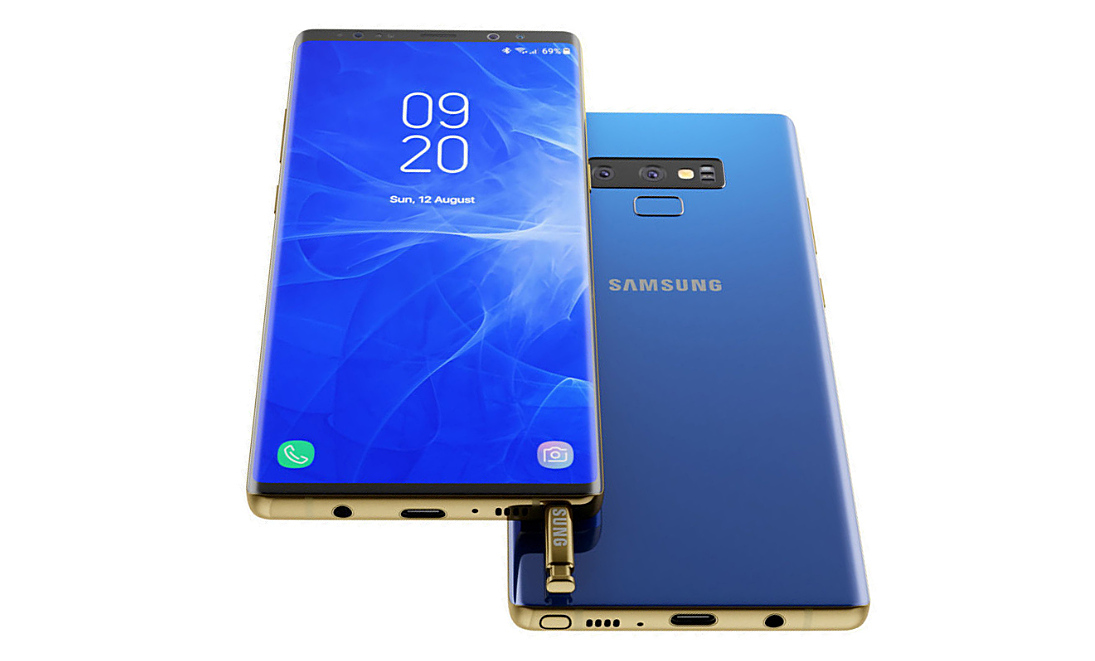Here's Why Samsung Galaxy Note9 Can Be The Best Cameraphone of 2018
If you're going to ask me what's the best cameraphone of all new models that are currently available in the market, I'd tell you can't go wrong picking Apple iPhone X, Samsung Galaxy S9+ (or S9 and even Note8), OnePlus 6, LG G7 ThinQ, and Huawei P20 Pro -- with the last one having the largest sensor, giving it a clear edge in low light conditions.
All of those handsets can definitely give you great color replication and can deliver sharp details and stunning dynamic range when used to snap images (and even videos) in settings with enough ambient light.
Needless to say, however, that list could change dramatically with the release of the 2018 iPhone X Series (with Apple's "Deeper Pixels", whatever those are) as well as the rumored Samsung Galaxy Note9, shown below via a fan 3D render.

I particularly have a great feeling about the Note9 because I believe it will be the first Galaxy Android smartphone to feature Samsung's remarkable new sensor that the Korean Giant crafted in partnership with imaging industry legend and titan, Fujifilm.
Although I don't have to reiterate the fact that Fujifilm has no experience in making cameraphones, this Japanese company has been making some of the best cameras mankind has ever seen for more than eight decades now. That has to count for something.
As I've shared in a previous post, what's special about the new Samsung-Fujifilm ISOCELL Plus sensor is that it has "walls" made of an innovative "new material" that effectively guides more details towards the photo receptor compared to the metal wall of the earlier ISOCELL sensor that reflects and absorbs some light away, which is detrimental to image sharpness. All the enhancements implemented on the ISOCELL Plus sensor, according to Samsung, results in a 15% improvement in light sensitivity and improved color fidelity

Whereas competing brands are focused on simply giving their smartphones large sensors, Samsung is clearly dedicated to enhancing the internal components of their imaging modules to make them even more powerful. To quote Mr. Ben K. Hur - Vice President of System LSI Marketing at Samsung Electronics, "The ISOCELL Plus will not only enable the development of ultra-high-resolution sensors with incredibly small pixel dimensions, but also bring performance advancements for sensors with larger pixel designs."
As of writing, Samsung has yet to announce if the latest generation Galaxy Note phablet will indeed have the ISOCELL Plus imaging sensor. But if the 2018 Samsung Galaxy Note9 will end up donning this incredible new technology, I think that model has a clear chance of being named the Best Cameraphone of 2018.
All of those handsets can definitely give you great color replication and can deliver sharp details and stunning dynamic range when used to snap images (and even videos) in settings with enough ambient light.
Needless to say, however, that list could change dramatically with the release of the 2018 iPhone X Series (with Apple's "Deeper Pixels", whatever those are) as well as the rumored Samsung Galaxy Note9, shown below via a fan 3D render.

I particularly have a great feeling about the Note9 because I believe it will be the first Galaxy Android smartphone to feature Samsung's remarkable new sensor that the Korean Giant crafted in partnership with imaging industry legend and titan, Fujifilm.
Although I don't have to reiterate the fact that Fujifilm has no experience in making cameraphones, this Japanese company has been making some of the best cameras mankind has ever seen for more than eight decades now. That has to count for something.
As I've shared in a previous post, what's special about the new Samsung-Fujifilm ISOCELL Plus sensor is that it has "walls" made of an innovative "new material" that effectively guides more details towards the photo receptor compared to the metal wall of the earlier ISOCELL sensor that reflects and absorbs some light away, which is detrimental to image sharpness. All the enhancements implemented on the ISOCELL Plus sensor, according to Samsung, results in a 15% improvement in light sensitivity and improved color fidelity

Whereas competing brands are focused on simply giving their smartphones large sensors, Samsung is clearly dedicated to enhancing the internal components of their imaging modules to make them even more powerful. To quote Mr. Ben K. Hur - Vice President of System LSI Marketing at Samsung Electronics, "The ISOCELL Plus will not only enable the development of ultra-high-resolution sensors with incredibly small pixel dimensions, but also bring performance advancements for sensors with larger pixel designs."
As of writing, Samsung has yet to announce if the latest generation Galaxy Note phablet will indeed have the ISOCELL Plus imaging sensor. But if the 2018 Samsung Galaxy Note9 will end up donning this incredible new technology, I think that model has a clear chance of being named the Best Cameraphone of 2018.
Labels:
Cameraphones
Editorial
Featured
Fujifilm
ISOCELL Plus Sensor
Samsung
Samsung Fujifilm Partnership
Samsung Galaxy Note9
Smartphones

